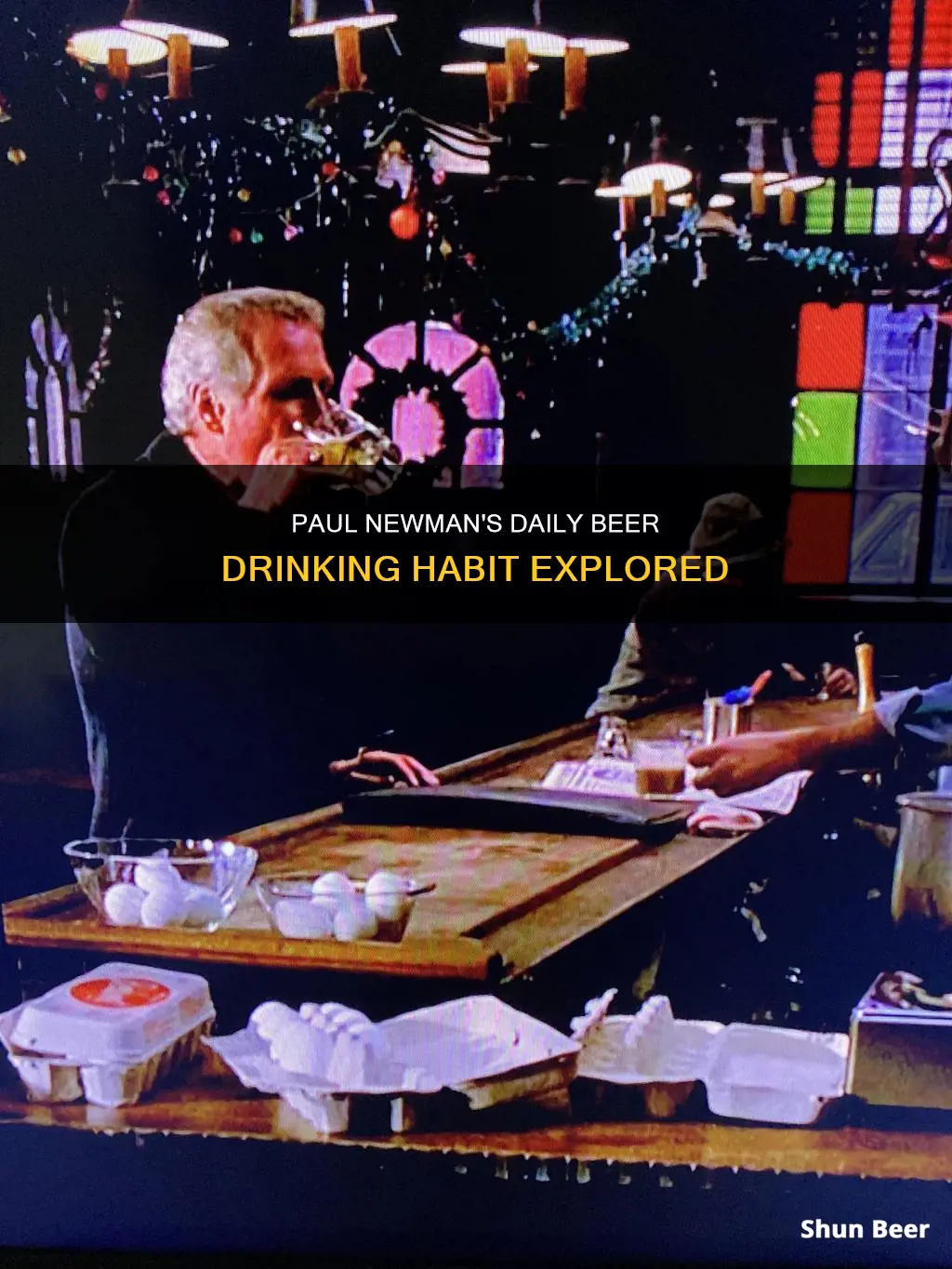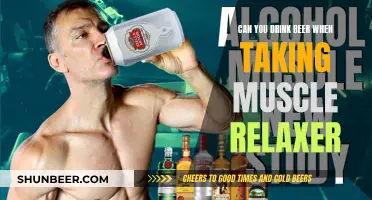
Paul Newman was a successful actor who was often associated with beer drinking. Newman's daughters described him as a high-functioning alcoholic in a documentary series, and his obituary in the San Francisco Chronicle noted that he loved drinking beer. A tradition known as Newman Day or Newman's Day was started by college students and involved drinking 24 beers in 24 hours. Newman publicly opposed this tradition and asserted that the quote that inspired it was misattributed. Despite his public stance against binge drinking, Newman struggled with alcohol himself and was known to drink beer in various settings.
| Characteristics | Values |
|---|---|
| Number of beers consumed per day | 12 or more |
| Drinking habits | Newman drank beer and scotch, and was known for drinking "beer after beer after beer, a case or more a day" |
| Collegiate drinking tradition | Newman Day, or Newman's Day, is a tradition at Bates College, Kenyon College, and Princeton University, where students attempt to drink 24 beers in 24 hours |
| Opposition to drinking traditions | Newman publicly opposed the drinking tradition associated with his name, calling it "abhorrent" and "cruel" |
| Personal struggles with drinking | Newman struggled with drinking and advocated against substance abuse after the death of his son, Scott, from a drug overdose |
| High-functioning alcoholic | Newman's daughters described him as a high-functioning alcoholic, and he admitted to having a taste for alcohol |
What You'll Learn

Paul Newman's daughters describe him as a high-functioning alcoholic
Paul Newman's daughters described him as a "high-functioning alcoholic" in the documentary series "The Last Movie Stars". They revealed that their father would get
Newman's drinking reportedly caused his wife, Joanne, to threaten to leave him and take their children. However, they reconciled after he promised to give up hard liquor. Newman carried a bottle opener on a chain around his neck and was known for drinking "beer after beer after beer, a case or more a day", according to the book "Paul Newman: A Life". The book also claims that Newman would move on to drinking scotch in the evenings, a process that was repeated for years.
Newman's drinking was not limited to his private life. Onlookers and movie personnel reported that he was often seen "drinking beers on the set, in his office, at parties, during interviews, watching TV, getting ready for TV, and relaxing after dinner". Despite his struggles with alcohol, Newman publicly opposed the college binge-drinking tradition that had become associated with his name. Newman Day, or Newman's Day, involves participants trying to consume a beer an hour for 24 hours. Newman strongly opposed the tradition, writing letters to university presidents and taking out a page in a student newspaper to express his disapproval and encourage students to participate in community service instead.
Newman's struggle with alcohol became more widely known following the release of the HBO Max documentary and Shawn Levy's biography, "Paul Newman: A Life". Despite his issues with alcohol, Newman successfully advocated against substance abuse following the death of his son, Scott, from a drug overdose in 1978.
Drinking NA Beer: Safe Driving or Legal Trouble?
You may want to see also

Newman's son, Scott, died from a drug overdose in 1978
Paul Newman was an avid beer drinker, and while it is unclear if he drank 12 beers a day, he was known to enjoy drinking beer regularly. Newman's drinking habits were often mentioned by his friends and even featured in his obituary in The San Francisco Chronicle. However, his predilection for beer was not widely known, perhaps because it contradicted his image as a happily married, successful, and philanthropic individual.
Newman's drinking habits are especially noteworthy due to the tragic loss of his son, Scott Newman, who died from a drug overdose in 1978 at the age of 28. Scott, whose full name was Allan Scott Newman, was an actor, stuntman, and part-time singer. He was the only son and eldest child of Paul Newman and his first wife, Jackie Witte.
Scott Newman struggled with alcohol and drug abuse, which ultimately led to his untimely death. He had been taking painkillers after a motorcycle accident and was also consuming alcohol. On the night of November 19, 1978, he accidentally took a fatal dose of valium mixed with alcohol and other drugs. He was found in a hotel room in Los Angeles, and his death was ruled an accident by the authorities.
The loss of his son deeply affected Paul Newman, who established the Scott Newman Center in his memory. The center is dedicated to preventing drug abuse through education and helping families dealing with drug abuse and alcoholism. Newman also expressed his feelings of guilt and remorse in his posthumous memoir, "The Extraordinary Life of an Ordinary Man." In the memoir, he reflects on his relationship with Scott and his struggles with addiction, revealing that he often questioned if there was something more he could have done to help his son.
Pets and Beer: What's the Deal?
You may want to see also

Newman founded a centre to help prevent substance abuse
Paul Newman's son, Scott Newman, died from a drug and alcohol overdose in 1978 at the age of 28. Following his son's death, Newman founded the Scott Newman Foundation (later known as the Scott Newman Center) to help prevent substance abuse. The centre produces short films and other educational materials to raise awareness of the dangers of drug and alcohol abuse.
The Scott Newman Center also runs a camp, The Rowdy Ridge Gang, for children and families affected by substance abuse and domestic violence. The camp provides a supportive environment for those struggling with addiction and offers a range of activities to promote healing and recovery. In addition to the camp, the centre has developed innovative, research-based drug prevention projects and materials that target families, schools, and communities.
Newman was a well-known actor and philanthropist who used his platform to raise awareness about the dangers of substance abuse. He was also an anti-drug activist, speaking out against the college binge-drinking tradition known as "Newman Day" or "Paul Newman Day." This tradition, which involved consuming 24 beers in 24 hours, was started by college students who falsely attributed a quote about drinking to Newman. Despite his public disapproval, the tradition persisted at some universities.
Newman's own struggles with drinking were not widely known during his lifetime. However, he recognised the dangers of substance abuse and dedicated himself to helping others avoid the tragic consequences that his family experienced. Through the Scott Newman Center and his other philanthropic endeavours, Newman made a lasting impact on the lives of many individuals and families struggling with addiction.
Ashland, Alabama: Beer Drinking Laws and Regulations
You may want to see also

Newman opposed the college binge-drinking tradition named after him
Paul Newman was a man of many talents and a philanthropist. However, he was also a heavy drinker, and his predilection for beer was well-known among his close friends. In fact, his obituary in the San Francisco Chronicle noted that "Mr Newman revelled in certain aspects of stereotypical male behaviour. He loved drinking beer and playing elaborate pranks on friends."
Despite his love of beer, Newman opposed the college binge-drinking tradition named after him. Newman Day, also known as Newman's Day, is a collegiate drinking tradition in which 24 beers are consumed over 24 hours. The ritual was initiated by students of Bates College in Lewiston, Maine, in January 1976. It was inspired by a quote that was falsely attributed to Newman: "24 hours in a day, 24 beers in a case. Coincidence? I think not."
Newman, who struggled with drinking himself, strongly opposed the tradition, calling it "abhorrent" and "cruel". He wrote letters to the presidents of Bates College and Princeton University, denouncing the activities and requesting that they stop. In a letter to the President of Bates College, Thomas Reynolds, Newman wrote:
> I was surprised to learn that a day which was held in my honor was actually an excuse for drunkenness, disregard for property, disrespect for people, and deeds of questionable character. That the tradition of these activities has been wisely quashed by those in authority is indeed a relief. I would like to propose that Paul Newman Day be reinstated under somewhat different guidelines; i.e., a day in pursuit of athletic excellence with paid attendance. The proceeds to be returned to the community in ways of your own choosing. I would be grateful to learn if the students find any merit in this.
Newman also took out a full-page ad in Princeton's college newspaper, The Daily Princetonian, to express his disapproval and assert that the quote was misattributed. During an interview with The New York Times, he stated that students at participating universities were free to do as they pleased but that they shouldn't use his name. Instead, he encouraged them to participate in "twenty-three hours of community service followed by a cold one."
The tradition has since been picked up by other colleges and universities and it has inspired similar activities and spin-offs. Despite Newman's efforts to disassociate himself from the tradition, his name remains attached to it.
Beer and Health: Is Any Amount Safe?
You may want to see also

Newman was identified by his love of beer
Paul Newman was identified by his love of beer. In his obituary in the San Francisco Chronicle, he was described as revelling in "certain aspects of stereotypical male behaviour", including drinking beer and playing pranks on friends. His best friend, A. E. Hotchner, also recalled days spent "on Long Island Sound, drinking beer and scaring the fish".
Newman's predilection for beer was not widely known, perhaps because it contradicted his image. He was a happily married man, a successful professional, and a philanthropist. He was also an anti-drug activist, a stance he adopted following the death of his son from a drug overdose.
Despite his love of beer, Newman struggled with the drinking tradition at Princeton University that bore his name. Newman's Day, or Newman Day, involved students attempting to consume 24 beers in 24 hours, based on a quote attributed to Newman: "Twenty-four beers in a case, 24 hours in a day. Coincidence? I think not."
Newman publicly opposed this tradition, calling it abhorrent and cruel. He wrote letters to the university's president and took out a full-page ad in the campus newspaper, The Daily Princetonian, to express his disapproval and disavow the quote. He proposed an alternative version of the day, suggesting 23 hours of community service followed by a cold one.
Newman's struggle with alcohol was also documented in the HBO Max documentary series 'The Last Movie Stars', where his daughters described him as a high-functioning alcoholic who created a destructive environment within their household. They recalled him getting blackout drunk most nights and dipping his head into ice-cold water the next morning.
Newman's drinking habits were not limited to beer, as he was also known to move on to drinks like scotch in the evenings. He carried a bottle opener on a chain around his neck and was often seen drinking in various settings, including on set, in his office, at parties, and while relaxing at home.
Beer and Fishing: Texas Laws You Need to Know
You may want to see also
Frequently asked questions
Paul Newman's daughters described him as a
No, Newman publicly opposed the tradition, writing to universities to denounce the activity and taking out a full-page ad in a college newspaper to express his disapproval. He also encouraged students to participate in "twenty-three hours of community service followed by a cold one" instead.
Newman Day, also known as Paul Newman Day, was a tradition at Bates College and Princeton University, in which students tried to consume 24 beers in 24 hours. The tradition was based on a quote attributed to Newman: "Twenty-four beers in a case, 24 hours in a day. Coincidence? I think not."
Newman personally struggled with drinking and his son, Scott, died from a drug overdose in 1978. He founded a centre in his son's name to help prevent substance abuse and advocated against binge drinking to spread a more positive message.







